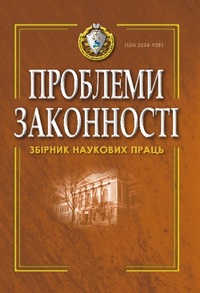Право та політична релігія: теологія радянського права
Law and Political Religion: the Theology of Soviet Law
Author(s): Dmytro О. VovkSubject(s): Law, Constitution, Jurisprudence, Politics and law, Politics and religion, History of Communism
Published by: Національний юридичний університет імені Ярослава Мудрого
Keywords: political religion; Soviet law; totalitarian state; Marxism-Leninism; law and politics; secularization of law;
Summary/Abstract: That paper is one of my works, in which I try to apply the concept of political religion to Soviet law studies. Many political philosophers and scholars use this concept for describing the nature of totalitarian regimes, for which metapolitical goals (achieving communism, Nation defense etc.) and the tasks of their own legitimacy strengthening and increasing the control of society presuppose the usage of means which are religious by their nature. Political studies of political religion are quite developed, but legal theory pays almost no attention to such concept. So, in the paper I am trying to answer the question: if Soviet political regime can be defined as political religion, what does it means for law? In this paper I pay significant attention to Soviet law theology, that is the development of Marxism-Leninism dogmas in legal realm, which I call the "symbol of faith" of Soviet Law. I show how the "symbol of faith" guided Soviet legal studies, what philosophical and legal problems they raised and the ways Soviet scholars solved them. I mean such problems as connection between law and economics, law and state, law and factual social relations, the role of law in achieving communism. In 1920s there were different versions of Marxist legal theory (Evgeny Pashukanis, Mikhail Reysner, Pyotr Stuchka, and others), but at the beginning of 1930s the unification of approaches was being made (the 1938 narrow-normative definition of law by Andrey Vyshinsky became its). The Vyshinsky’s definition was partly rejected during post-Stalin era, the new attempts to substantiate the broader understanding of law by connecting it with legal conscience and legal relations appeared. Though these conceptions were formally substantiated as attempts to find "the right one" Marxist understanding of law, their authors were rather trying to reconcile their own vision of law with official ideology. In the paper I also delineate how Soviet law theology influenced Soviet law system. By using some examples, I argue that this theology was not just the set of ideas far from legal practice. For example, Soviet ideological dogmas determined the development of the socialistic legality doctrine as the key doctrine of Soviet legal order. At the same time Soviet legal system has never been developed exclusively under influence of Soviet political religion; it always was a mixture of influences, including Marxist-Leninist teachings, civil law tradition, political reasons etc.
Journal: Проблеми законності
- Issue Year: 284/2024
- Issue No: Special
- Page Range: 123-160
- Page Count: 38
- Language: Ukrainian

